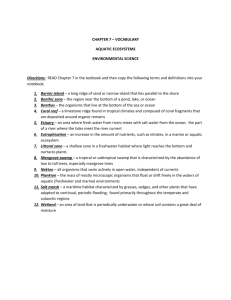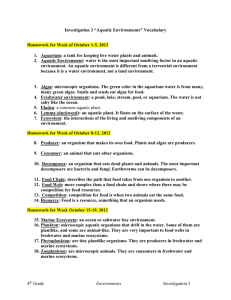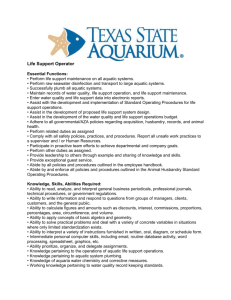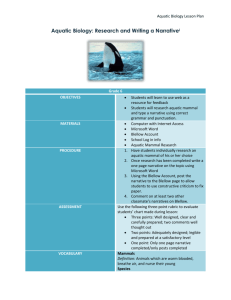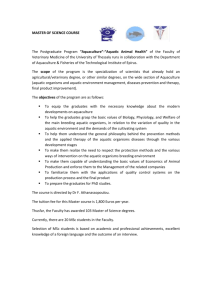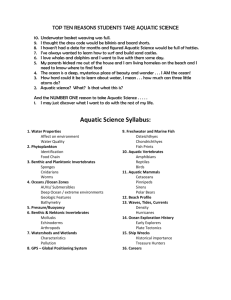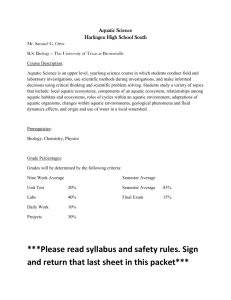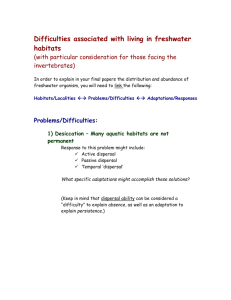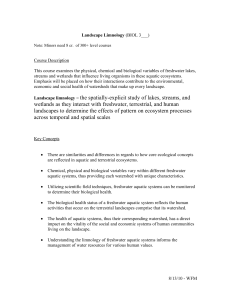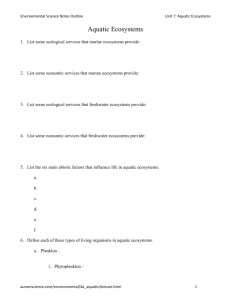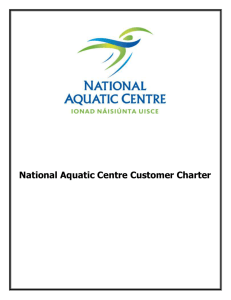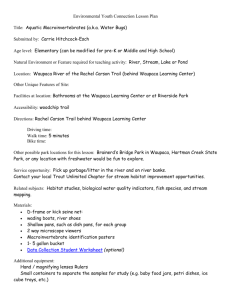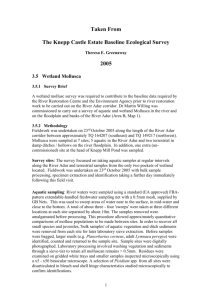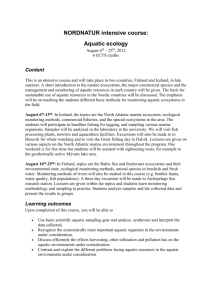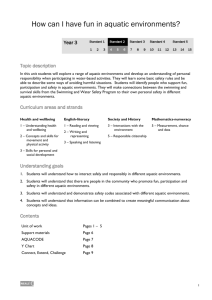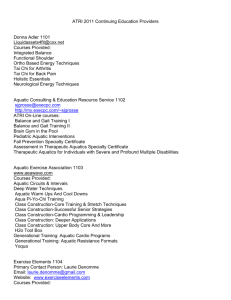Aquatic Science Syllabus
advertisement
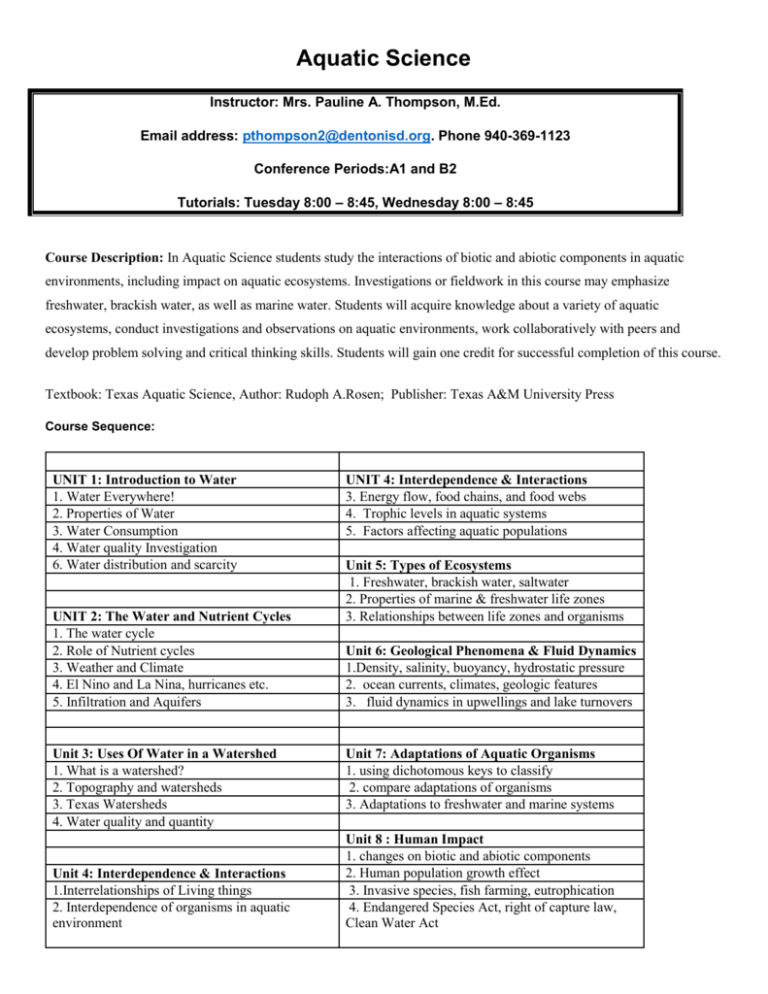
Aquatic Science Instructor: Mrs. Pauline A. Thompson, M.Ed. Email address: pthompson2@dentonisd.org. Phone 940-369-1123 Conference Periods:A1 and B2 Tutorials: Tuesday 8:00 – 8:45, Wednesday 8:00 – 8:45 Course Description: In Aquatic Science students study the interactions of biotic and abiotic components in aquatic environments, including impact on aquatic ecosystems. Investigations or fieldwork in this course may emphasize freshwater, brackish water, as well as marine water. Students will acquire knowledge about a variety of aquatic ecosystems, conduct investigations and observations on aquatic environments, work collaboratively with peers and develop problem solving and critical thinking skills. Students will gain one credit for successful completion of this course. Textbook: Texas Aquatic Science, Author: Rudoph A.Rosen; Publisher: Texas A&M University Press Course Sequence: UNIT 1: Introduction to Water 1. Water Everywhere! 2. Properties of Water 3. Water Consumption 4. Water quality Investigation 6. Water distribution and scarcity UNIT 2: The Water and Nutrient Cycles 1. The water cycle 2. Role of Nutrient cycles 3. Weather and Climate 4. El Nino and La Nina, hurricanes etc. 5. Infiltration and Aquifers Unit 3: Uses Of Water in a Watershed 1. What is a watershed? 2. Topography and watersheds 3. Texas Watersheds 4. Water quality and quantity Unit 4: Interdependence & Interactions 1.Interrelationships of Living things 2. Interdependence of organisms in aquatic environment UNIT 4: Interdependence & Interactions 3. Energy flow, food chains, and food webs 4. Trophic levels in aquatic systems 5. Factors affecting aquatic populations Unit 5: Types of Ecosystems 1. Freshwater, brackish water, saltwater 2. Properties of marine & freshwater life zones 3. Relationships between life zones and organisms Unit 6: Geological Phenomena & Fluid Dynamics 1.Density, salinity, buoyancy, hydrostatic pressure 2. ocean currents, climates, geologic features 3. fluid dynamics in upwellings and lake turnovers Unit 7: Adaptations of Aquatic Organisms 1. using dichotomous keys to classify 2. compare adaptations of organisms 3. Adaptations to freshwater and marine systems Unit 8 : Human Impact 1. changes on biotic and abiotic components 2. Human population growth effect 3. Invasive species, fish farming, eutrophication 4. Endangered Species Act, right of capture law, Clean Water Act Grading Policy: 40%: Minor Summative: Quizzes, journal entries, lab write ups, graphic organizers, learning logs, 60%: Major Summative: Tests, projects, presentations, common assessments, portfolios, performance tasks, essays Field Trips: There will be THREE optional field trips planned. Each trip will be out of pocket and are amazing experiences. You will be updated later on the locations and dates. Tutoring/Retesting/Absences/Make-up Work: You may reassess a failed test for full credit (100%), within 10 school days. Prior to retesting you MUST attend tutoring and be deemed ready by the teacher. You will complete and sign a tutoring/reassessment form prior to testing. Absent students need to take the responsibility to make up work during scheduled tutorial times. Materials/Supplies 1. 2. 3. 4. 5. Composition quad-ruled notebook for journaling (MANDATORY). Colored pencils or markers Glue sticks Pens and pencils Kleenex or Napkins Class Policies & Expectations 1. ON TIME means you are in your seat and READY when the bell rings!!!! 2. The bell does not dismiss you, I do! 3. Always be prepared to learn and complete your daily goals! 4. Electronic devices are only allowed with teacher’s permission during a planned activity. Electronic Devices The use of iPads, Chrome Books, MacBooks, and other electronic devices are encouraged in my class for research. If however, you abuse this privilege by visiting sites that are not permitted during the lesson and become off task, you will lose this privilege. Discipline: Actions that interfere with the learning environment and process such as: class disruption, not completing assignments, refusing to participate in class, chronically turning in late work, will be met with disciplinary actions that include, but are not limited to: Detention Saturday School ISSC Loss of Parking Permit Loss of Dismissal Period Also: See SCOC t I UNDERSTAND THESE POLICIES AND PROCEDURES AND AGREE TO ABIDE BY THEM Parent/guardian name ______________________ Signature_____________ Date___ Student name _____________________________ Signature_____________ Date ___
